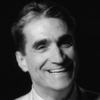Robert Pinsky

Robert Pinsky
Robert Pinskyis an American poet, essayist, literary critic, and translator. From 1997 to 2000, he served as Poet Laureate Consultant in Poetry to the Library of Congress. Pinsky is the author of nineteen books, most of which are collections of his poetry. His published work also includes critically acclaimed translations, including The Inferno of Dante Alighieri and The Separate Notebooks by Czesław Miłosz. He teaches at Boston University...
NationalityAmerican
ProfessionPoet
Date of Birth20 October 1940
CityLong Branch, NJ
CountryUnited States of America
The best argument for teaching poetry is to put a three-year-old or a four-year-old and read Dr. Seuss, or Robert Louis Stevenson, and to feel how the child and you are engaging in something that's really basic to the animal, which is passing on in these rhythmic ways, something that came from somewhere.
The wonderful 17th Century poet, Robert Herrick, wrote a poem entitled, 'To Live Merrily and to Trust to Good Verses.' Easy to say, Robert Herrick; not always easy to do. But it's a good slogan, I think.
I'm far from immune to the American, perhaps historically male, prejudice toward practical and physical competence; I hope I've also considered that prejudice enough to have some distance from it.
I love form, but I'm not interested in forms. I've never written a sonnet or villanelle or sestina or any of that. For me, it's a kind of line. It's a rhythm. It's something musical.
'Write' is almost the wrong verb for what I do. I think 'compose' is more accurate because you're trying to make the sounds in your mind and in your voice. So I compose while I'm driving or in the shower.
Vivid and reflective, documentary and visionary, re-imagining the city of New York with the same urgency that ponders the opening words of Genesis, this is a passionate, artful and re-readable book.
The test of whether it's poetry is: does it sound beautiful when you say the words over, in your mind or your voice, with no skilled performer, no music, just the sounds and meanings in the words themselves,
I am a frustrated saxophone player. If I could, I would abandon all of my books, and I would trade it all if I could play the way people I admire play.
Poetry is not easy. Or should I say, real poetry is not easy.
Poetry is a vocal art for me - but not necessarily a performative one. It might be reading to oneself or recalling some lines by memory.
New Jersey is the most poetic state: close enough to New York to be urban and cosmopolitan, far enough to be desirous and unsure; densely populated, but full of farms and woods, with the most deer of any state.
All questions of process require an answer that begins with a very important sentence, and the sentence is: 'Everybody is different.' Whatever way of working you name - methodical, haphazard, gets up early in the morning, sleeps all day, works at night, revises immensely, never revises at all - someone has made great work with that way.
It's true that school can poison things - some people hate W.C. Williams' little poem about the wheelbarrow because somebody bullied them with it in school,
For an American, there's no automatic place where people love the art of poetry. There's not a social class that considers poetry its property the way in some countries there's a snob value to the art.